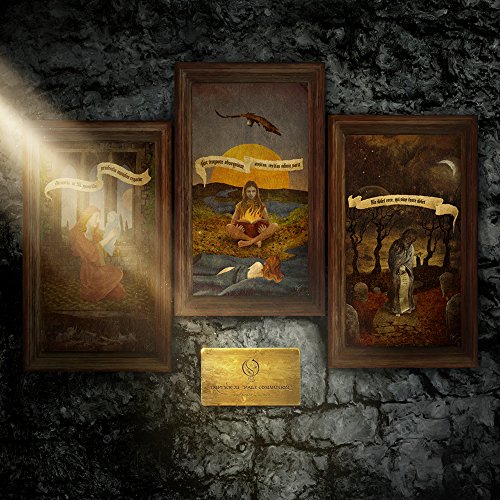
Opeth
Pale Communion
Release Date: Aug 26, 2014
Genre(s): Pop/Rock, Heavy Metal
Record label: Roadrunner Records
Music Critic Score
How the Music Critic Score works
Buy Pale Communion from Amazon
Album Review: Pale Communion by Opeth
Very Good, Based on 10 Critics
Based on rating 5/5
It almost seems a shame that Opeth are routinely saddled with the divisive "progressive" tag, as the Swedes' music is so consistently refined, vivid and sincere that it's hard to fathom anyone rejecting it wholesale. In contrast to 2011's Heritage, which veered off in a number of esoteric directions, this is an admirably coherent collection of songs that are as uncompromisingly intricate and strange as they are incisively melodic. Mikael Åkerfeldt's voice has become a thing of wonder; his ability to tug at heartstrings while singing the most wilfully hazy of lyrics is matched only by these songs' beautiful arrangements and pin-sharp ensemble playing.
Based on rating 9/10
When Opeth released Heritage in 2011 -- the wonderfully indulgent, somewhat unfocused exercise in prog rock aesthetics -- some longstanding fans were offended because the band had abandoned death metal. Truthfully, they had been exploring prog in fits and starts since 2005's Ghost Reveries. Pale Communion completes the transition, proving that Heritage was not only a next step, but a new beginning altogether.
Based on rating 8/10
Opeth‘s 2011 album Heritage was, no doubt, a shock to many. The complete lack of death growls, to say nothing of the relative dearth of heavy distorted riffs, seemed to fly in the face of the notion that Opeth was at the top of the progressive metal heap. But the question of Opeth has never been, “Prog?”; rather, it has been “How much prog?” Over the course of the band’s now almost 20 year existence, its roots in death metal slowly began to dissolve in favor of a dynamic, suite-oriented song structure reminiscent of classic progressive rock, a genre favored by magnetic frontman Mikael Åkerfeldt.
Based on rating 4/5
Note before listening: a newcomer to Opeth could play any of their last four albums side by side without spotting too many obvious differences. Since the Swedish band shed their heavy metal roots and emerged as a fully-fledged progressive rock group of the mid-70s school, their speciality has been long, complex, atmospheric songs that tend to blur into one after a while. That doesn’t mean that the songwriting quality ever drops, though: any recent Opeth album, including this new one, is rather like a symphony or film soundtrack, a wholly gobsmacking aural experience that leaves the listener reeling with the sumptuousness of it all.
Based on rating 7/10
There have been numerous glaring indicators of Opeth's transformation from beautiful-yet-brutal death metal band to the less definable "progressive" tag: integrations of folk, lush piano, off kilter time signatures and (gasp) stunning, clean vocals. The definitive break was perhaps the release of Heritage in 2011, the tour for which found Mikael Åkerfeldt deliver not a single guttural howl (to the grumbling of many attendees). That Åkerfeldt's 2014 curation of Roadburn Festival featured Magma, Comus, Goblin and Änglagård confirm it: Opeth are not a death metal band.
Based on rating 4.3/10
Can you name a band that's less cool than Opeth? For a quarter-century, Mikael Åkerfeldt’s ever-amorphous set of Swedes has let the effort show with every sound, song, and surprising genre twist. At various points in Opeth’s career, their style has been categorized as progressive rock, death metal, or progressive metal, though each of those terms felt, at best, like undersized umbrellas for a band actively coercing bits of jazz, Romanticism, blues, British folk, pop, and new age into their musical madhouse. Opeth is so demanding that, a decade ago, they opted to issued two separate albums—the clenched Deliverance and the much more calm Damnation—rather than package them as an intended, insurmountable double album; still, sold separately, each half of the dichotomous pair broke or pushed the one-hour mark and twisted and turned with a maniacal and delightful zeal.
Based on rating 2/5
Having already veered hard towards the shoals of early ’70s-style progressive rock on 2011’s 'Heritage,' Mikael Åkerfeldt practically runs the good ship Opeth aground with a prog-intensive album that often sounds closer to soggy Jethro Tull outtakes than anything in his band’s mighty back catalog. The playing is impeccable as always, and Åkerfeldt has certainly earned the right to follow his own muse wherever it may lead. But the loyalty of longtime Opeth fans—especially those already put off by 'Heritage'—may be seriously tested.
Opinion: Fantastic
From the outset of Opeth's existence in 1990, the Swedish act defied easy categorisation. Sure, the deep, guttural vocals and dominant riffing style of Opeth's visionary Mikael Åkerfeldt owed a multitude to malevolent entities such as Morbid Angel, Cannibal Corpse, Deicide or Death, but his ambition for grandeur was heard in compositions as early as those found on their 1995 debut, Orchid. However, it wasn't until their landmark album Blackwater Park, released in 2001, that Åkerfeldt felt confident enough as a composer to truly expand Opeth's musical horizons by exploring his love of progressive rock's nuance, structure and melody, and how to further incorporate same into death metal.
Opinion: Excellent
On 2011’s Heritage, the 10th full-length of a career dating back to 1990, Opeth stepped away from their metallic origins and strode into the prog-rock territory they had flirted with over their preceding releases. While it had some solid songs and was at heart still an Opeth record, it was hard to escape the feeling that it was rather self-indulgent, making it at times hard to invest in. With Pale Communion, they continue to follow a prog-rock vein, but by focusing much more on melody it is a far more rounded, involving and engaging collection.
Opinion: Average
Recent reviews by this author TV on the Radio Young LiarsHammock Maybe They Will Sing for Us Tomorrow Russian Circles StationUnwound New Plastic Ideas Helmet MeantimeStrike Anywhere Dead FM.
'Pale Communion'
is available now

